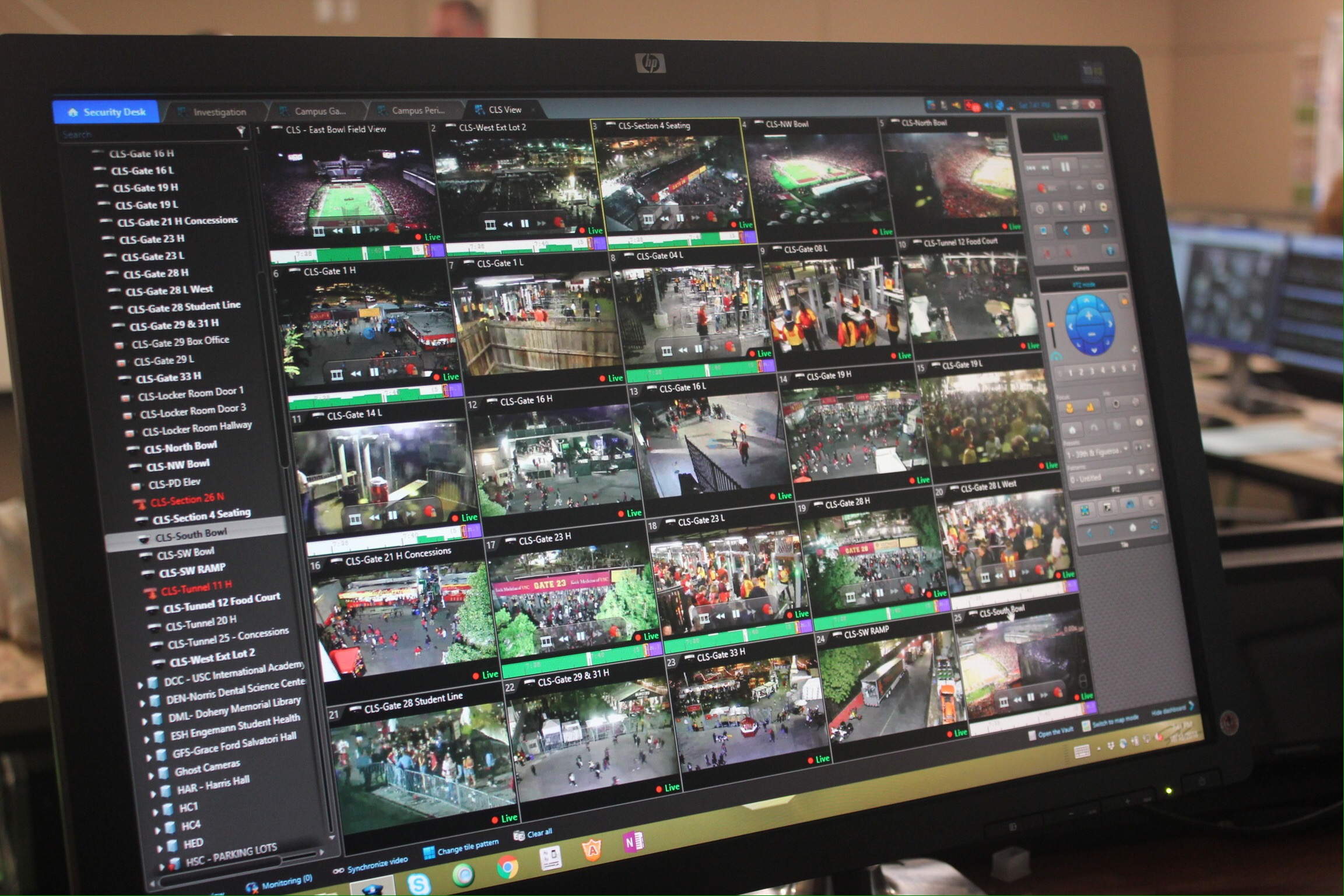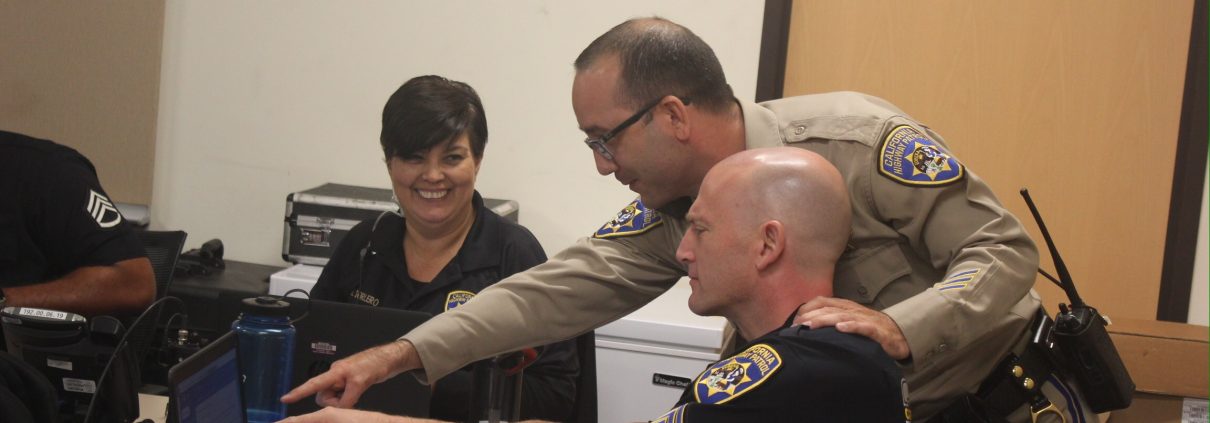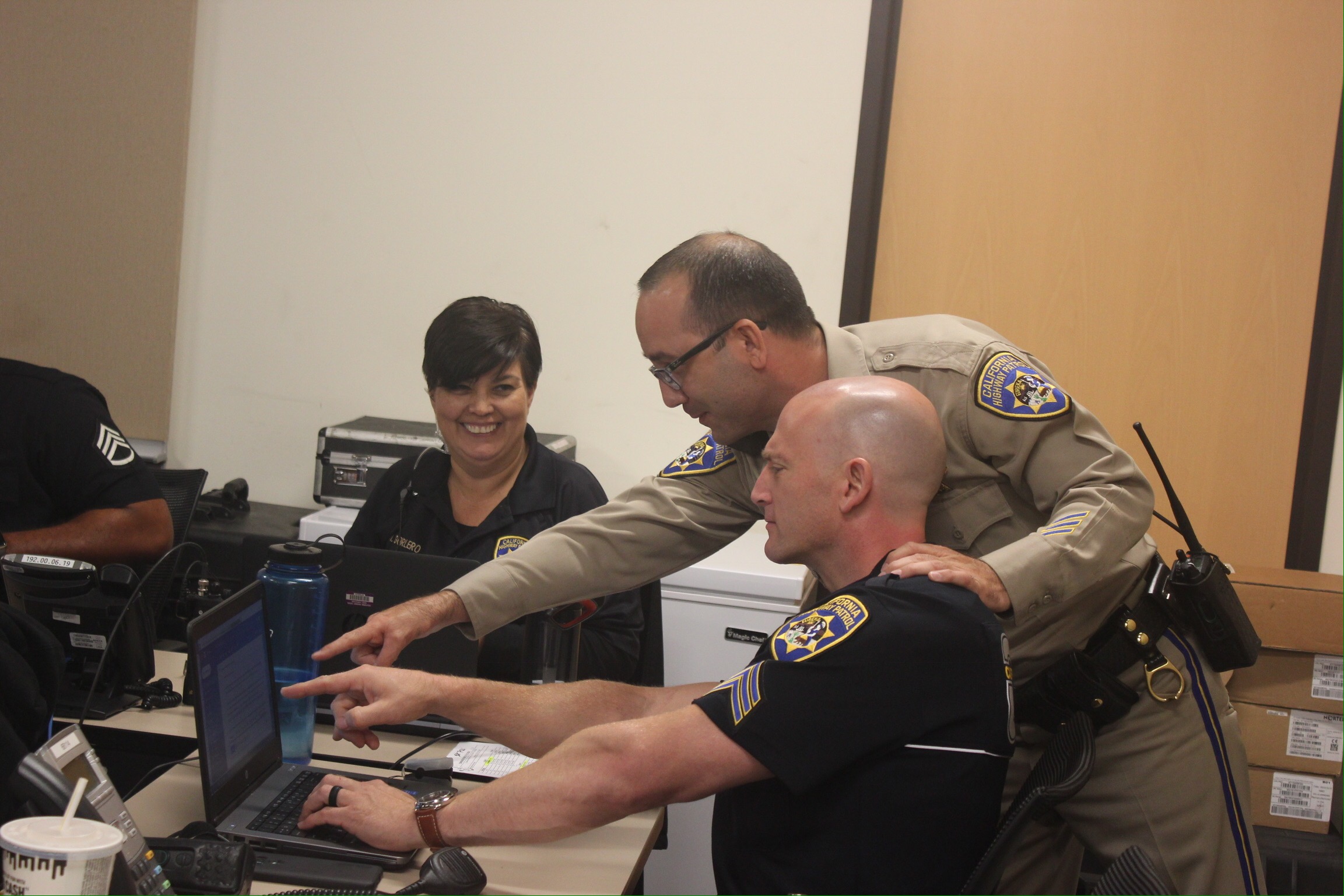The other gameday playbook: Inside DPS’ command center
Antonio Soria spotted the scalper standing in the middle of Trousdale Parkway as he surveyed footage. At first glance, nothing in the frame seemed suspicious, but Soria knows how to find the needle in the haystack.
“Have you ever seen, for example, a group of ants? All of them are traveling one way,” said Soria, who works for the Department of Public Safety. “Put an object around it. They’ll go crazy, because they’re trying to avoid it.”
To Soria, the ants are fans on their way to the Los Angeles Memorial Coliseum on Oct. 13, and the “object” is the scalper, a person who illegally re-sells tickets for that evening’s game. And he’s right — it’s obvious that the fans heading to the game are avoiding him.
Soria works in the Unified Command Center, a building just east of campus where multiple law enforcement offices assemble for every event at the Coliseum. Each department is here for a specific, different reason: The California Highway Patrol has jurisdiction over state property like Exposition Park, the Los Angeles Fire Department handles medical emergencies and the FBI handles general large-scale emergencies. DPS and the Los Angeles Police Department deal with minor threats and criminal infractions at each game.

Antonio Soria, the DPS surveillance operations manager, scrolls through live CCTV footage of campus and the Coliseum. (Sasha Urban | Daily Trojan)
Of the 33 biggest football schools in the country, Sports Illustrated ranked USC 22nd for gameday safety, with an average of 20 incidents per gameday last year. But unlike most universities, USC shares its stadium with a professional team, and USC is located in the second-largest city in the United States, making the campus and surrounding area more susceptible to crime.
As far as DPS Chief John Thomas knows, USC’s surveillance collective is the only one of its kind among Pac-12 schools.
“In the event that something happens, all of the entities that will be first responders to an incident are right here,” Thomas said.
Bob Green, formerly the LAPD Operations-South Bureau commanding officer, brought the command center model to USC five years ago. He modeled the system after the National Response Plan, which the federal government describes as “a guide to how the Nation responds to all types of disasters and emergencies.”
“The whole rationale is to build relationships between all the first responders and have a plan before an incident happens so we can help [prevent] and predict potential problems,” Green said.
Around 30 law enforcement officers are involved in the operation that takes up a single, slightly crowded room. Two projection screens showing CCTV footage line the front wall behind a desk with two monitors. Various maps of the Coliseum and campus decorate the walls and tables, along with a television playing TMZ on the screen in the corner.
Considering the influx of people on campus, the tone of the room is noticeably calm. Elizabeth Carreño, the DPS community relations manager, even studies in her spare time. But the room’s collective ability to act procedurally is not by chance. Many of the people in the room have been working in the UCC since its inception in 2013.
“We know each other very well and we’re constantly communicating,” said CHP Lieutenant Adam Smith. “And that’s helped with the activity of the command center.”

Antonio Soria’s monitor showing 25 CCTV transmissions on campus and in the Coliseum. (Sasha Urban | Daily Trojan)
The eye of the storm
The heart of the operation lies in the hands of Soria, the DPS surveillance operations manager. He stands at the front of the room, scrolling through around 40 of the nearly 3,000 cameras positioned on and around campus, looking for inconsistencies and common problems.
Almost every officer in the room cited intoxication as the primary concern — 40 percent of incidents on game days last season were alcohol-related, according to the Sports Illustrated report. And the UCC is accustomed to seeing fans stumble around campus on the CCTV screens.
At one point after kickoff, the room observed a fan who appeared intoxicated as he made his way to a bench near Jefferson Boulevard and Hoover Street, accompanied by two women.
“The whole rationale is to build relationships between all the first responders and have a plan before an incident happens.” — Bob Green, former LAPD Operations-South Bureau commanding officer
“He’s got the wobbles!” one officer called out. When the man approached the end of the sidewalk, another officer yelled, “Get him out of the street!”
DPS eventually deployed two CSC workers to help the man, at which point Soria moved on to a different CCTV transmission.
But on this day, heat and alcohol-induced emergencies were not as prevalent as they typically are, Thomas said. Instead, Soria and other officers noticed scalpers and vendors on campus. Some were selling hot dogs, but others broke trademark laws by hawking unauthorized USC gear.
“Our response next time will be to increase enforcement of that and possibly even having individuals from another entity, ABC or trademark licensing, doing some undercover stuff to be more effective,” Thomas said.
Listen to “The Other Gameday Playbook” on Spreaker.
Along with the UCC, two other command stations can zoom and swivel the CCTV cameras: one next to the DPS headquarters on McClintock Avenue, the other inside the Coliseum. But Soria has primary authority, giving him the ability to override the other two centers if he needs to control the image. With this ability he has seen some things on the cameras that sound like they belong in an episode of “Punk’d.”
He once caught a man peeing in the stands of a soccer game at the Coliseum, completely unaware of the camera behind him.
“And then he finally turns and looks at the camera and they all started laughing, kind of like, ‘No one’s looking, right,’” Soria said. “And then of course we put that information down because he had done that. [Officers] went out there, and they escorted him off the Coliseum.”
The ins and outs
Linda Sandefur is an LAPD dispatcher for the Coliseum, but on game days she is also a liaison between the Coliseum and UCC. She said that because not everyone is on the same radio network, her job is to relay information for incidents that affect multiple departments.
Sandefur recalled an incident last year when law enforcement stopped a man who ran into the Coliseum with a knife.
“We had to work with everybody,” Sandefur said. “The outside people knew that he was coming, they had a description, but they had to try to get ahold of him.”
She said everyone inspected the camera footage while she followed radio transmissions until FBI agents caught the suspect by chance.
But save for a few exceptions, UCC typically manages traffic in and out of the Coliseum, including getting over 300 members of the Trojan Marching Band into the stadium about an hour before kickoff.
The L.A. Department of Transit blocks cars from turning onto Exposition Boulevard, and the county’s Metropolitan Transportation Authority cuts off light rail service as the band members cross the street.
Tyler Dixon, an LAFD captain, said that this UCC has become a model for other command centers in the L.A. area.
“About two or three years ago, we had the first Los Angeles fleet week,” Dixon said. “The model for the unified command post for that event used this command post as the best practice.”
He said the center was also an example for the Special Olympics a few years ago, and that the 2028 Olympics will use the same model.
Former Incident Commander Bob Green said that UCC is also beneficial for building relationships during pre-planned events so that first responders have common terminology for unplanned ones.
“It’s a very structured way to do business and it’s proven its worth,” Green said.



